On December 12th the BBC’s Lucy Williamson paid a visit to Jenin during a counter-terror operation which had begun the previous night and continued for two-and-a-half days.
The following day a report by Williamson titled ‘Support for Hamas grows among Palestinians in West Bank’ was published on the BBC News website’s ‘Middle East’ page.
Williamson’s account of the operation which had yet to be completed includes the following: 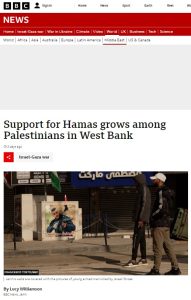
“Six men were killed in the operation here on Tuesday; four of them in a drone strike, witnesses said.
Israel says its operations in the West Bank are targeting members of armed groups, often those with Israeli blood on their hands.
But the director of Jenin’s hospital, Wissam Bakr, said a chronically ill 13-year-old child also died after being blocked from reaching medical care.
“The persistence of the incursions into Jenin, and the killing of young people – this will make the people more and more angry, because every day we lose one of our friends,” he said.
“This will not bring peace for Israel – this will bring more and more resistance.””
Williamson does not inform readers that the four people she describes only as “men” killed “in a drone strike” were throwing explosive devices at Israeli forces at the time. She provides no independent confirmation of the claim from the director of the Khalil Suleiman government hospital in Jenin (and the PA) regarding the death of a 13-year-old. Neither does she inform her readers of incidents of stone throwing from inside another hospital – Ibn Sina – where, as reported by Kan 11, wanted armed terrorists were hiding.
Although Williamson was happy to amplify Bakr’s framing of counter-terrorism operations as the cause of “resistance” rather than the inevitable response to terrorism, her report was not updated to inform BBC audiences of the terror infrastructure uncovered during this latest operation in Jenin.
“According to the IDF, troops scanned hundreds of buildings, arrested 60 wanted Palestinians, and seized 50 weapons and hundreds of explosive devices during the 60-hour incursion that began late Monday.
The IDF said the troops also found more than 10 tunnel shafts, seven labs used to manufacture explosive devices, and five war rooms used by local terror operatives to monitor IDF operations. Some of the sites were blown up by the troops.
The IDF said it carried out two drone strikes against groups of armed Palestinians hurling explosive devices and shooting at troops.
It said 10 armed Palestinians were killed during the raid, including seven in the drone strikes, and others were wounded.”
Williamson goes on to tell BBC audiences that:
“Here in the West Bank, 271 Palestinians, including 69 children, have been killed since the [October 7th] attacks – more than half the total number for the year. Almost all of them have been killed by Israeli forces, according to the United Nations.”
She neglects to clarify that – as reported by WINEP – 123 of those killed since October 7th were clashing with the IDF at the time, 74 were participating in violent rioting and 38 were killed during counter-terrorism operations. Neither does Williamson bother to inform her readers of the relevant context of Palestinian terror attacks during the same time period:
“According to data from the Israel Security Agency (Shin Bet), 128 significant terrorist attacks (i.e., acts of violence that result in Israeli casualties) have been carried out in (or in some cases from) the West Bank since October 7—101 in the northern part of the territory and 27 in the southern part. The vast majority of these were shootings (112), followed by stabbings (6), vehicular attacks (4), explosions (4), and rocket fire (2).”
Notably, Williamson’s report does nothing at all to inform BBC audiences about the highly relevant context of Hamas’ efforts to ignite terrorism in PA controlled areas for well over two years. That major omission is particularly relevant in light of the main theme of Williamson’s report, as promoted in its headline:
“Since the [October 7th] Hamas attacks, support for armed resistance [sic] has risen in many parts of the West Bank – in places like Nablus and Jenin.”
One of the commentators she brings in to support her claim is a terror supporting political activist who has previously contributed to BBC content.
“”I see it in the voices of people, in the music they play in their cars, from Facebook or social media posts, from my debates with my students,” said Raed Debiy, a political scientist and youth leader for the West Bank’s ruling party, Fatah, which dominates the Palestinian Authority (PA).
He told me the attacks were “a turning point” for Palestinians, just as they were a shocking turning point for Israelis.
“The people, especially the new generation, are backing Hamas now, more than at any other moment,” he told me. “In the previous 30 years, there were no models, no idols for the new generation; now they see there is something different, a different story is being created.”
Even his 11-year-old nephew, he said, had little respect for Palestinian President Mahmoud Abbas, but idolises Hamas military spokesman Abu Obeida – “because he protects us”.”
Williamson goes on to provide another “political scientist” contributor with a platform from which to promote terrorism and the annihilation of Israel: [emphasis added]
“”Palestinian youth had priorities and wish lists about owning a house, or getting a degree,” explained West Bank political scientist Amjad Bushkar.
“But after 7 October, I think these priorities have totally changed. There are rising voices for full liberation of the homeland through resistance – whether that resistance is peaceful or armed.”
Dr Bushkar told me that he had spent a total of nine years in Israeli jails, and had been a member of Hamas’s student wing in the past. Seven members of his family had been arrested since the 7 October attacks, he added.
Hamas members in the West Bank have regularly been targeted by Palestinian security forces – not just Israeli ones – since the group took control of Gaza by force in 2007, a year after it won parliamentary elections.
But now, Dr Bushkar said, something had changed.
“Both Fatah and Hamas are well aware that they are complementary to each other, and I think we’ll see real integration between the two movements.”
“The Palestinian Authority realised that targeting Hamas would not eradicate it because it’s an ideological movement rooted within the Palestinian people; and Hamas is fully aware that it cannot establish an independent [Palestinian] state without the help of Fatah.””
While that framing from Bushkar may not be particularly surprising, Williamson makes no effort to remind readers of the many examples of past failed ‘reconciliations’ between Fatah and Hamas even though she later returns to that topic:
“Some senior figures in the Palestinian administration – though not President Abbas – are now openly talking about the benefits of a united political front.
Earlier this month, Palestinian Prime Minister Mohammad Shtayyeh said in an interview with Bloomberg that the Palestinian Authority’s preferred outcome of the war in Gaza would be for Hamas to join a unity government led by the PA.”
Another contributor platformed by Williamson states:
“Qossay Hamed, an expert in Hamas at Al-Quds Open University in Ramallah, says the crisis in Gaza could end up strengthening the movement’s political wing, at the expense of its military one.
“In any revolutionary movement, there should be a political harvest to [military] actions,” he said.
“There are so many trends within Hamas. And there are internal clashes. I think there will be more room for the political trend within Hamas, especially after this war, when the whole world will not be tolerant towards them.””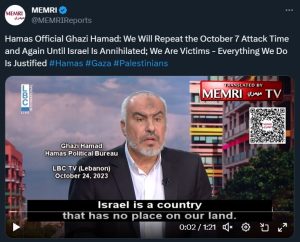
Williamson however fails to inform BBC audiences what the reference to Hamas as an “ideological movement” actually means or of recent statements reflecting that ideology made by members of its “political wing” such as Fathi Hammad, Ghazi Hamad, Sami Abu Zuhri or Mousa Abu Marzouk.
Williamson goes on to cite a recently published survey:
“An opinion poll carried out between 22 November and 2 December by a respected Palestinian think-tank, the Palestinian Center for Policy and Survey Research (PSR), found that support for Hamas had more than tripled in the West Bank compared to three months ago.
Supporters of Hamas were still in a minority, but 70% of the respondents said armed struggle was the best means of ending the Israeli occupation.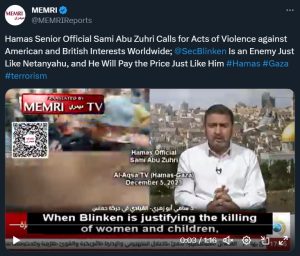
By contrast, support for President Abbas had dropped sharply following the Hamas attacks, the survey found, with more than 90% of Palestinians in the West Bank calling for his resignation.”
She does not clarify that the survey was conducted among 750 participants alone in PA controlled areas or that – as noted by several commentators – the survey showed widespread support for – and denial of – the atrocities perpetrated by Hamas on October 7th:
“We asked the respondents what they thought of Hamas’ decision to launch the October the 7th offensive given its outcome so far, a vast majority (72%; 82% in the West Bank and 57% in the Gaza Strip) said it was a correct decision and 22% (12% in the West Bank and 37% in the Gaza Strip) said it was incorrect. […]
85% say they did not see videos, shown by international news outlets, showing acts committed by Hamas against Israeli civilians, such as the killing of women and children in their homes; only 14% (7% in the West Bank and 25% in the Gaza Strip) saw these videos.
When asked if Hamas did commit these atrocities, the overwhelming majority said no, it did not and only 7% (1% in the West Bank and 16% in the Gaza Strip) said it did.”
Another notable paragraph in Williamson’s report reads as follows:
“While Hamas flags and slogans multiplied here in the wake of each busload of Palestinian prisoners released by Israel in exchange for Israeli hostages held in Gaza, the PA’s president and security forces were conspicuously absent.”
Readers may recall that less than three weeks earlier, Williamson had downplayed demonstrations of support for Hamas.
Until Williamson and her colleagues cease to gloss over Palestinian terrorism and whitewash Hamas’ ideology and agenda, BBC audiences will not be able to fully comprehend the implications and likely outcomes of rising support for that terrorist organisation and others among Palestinians in areas currently under PA control.
Related Articles:
BBC WS RADIO TRIES TO EXPLAIN THE ‘LIONS’ DEN’ – PART TWO
BBC NEWS TOUTS ‘PALESTINIAN UNITY’ WHILE IGNORING SUMMARY EXECUTIONS

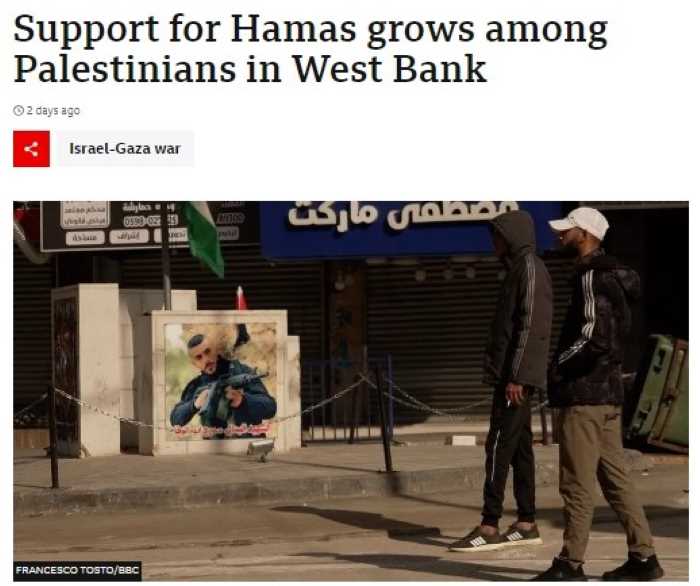

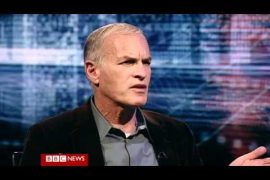

The Iranian Propaganda Corporation (aka BBC) by default always gives credibility to reports by Iranian puppets – and never to Israeli reports (unless they are admissions of guilt). Wake up UK – and take the BBC to task over their treason.
The British public are now ashamed of the once informative BBC who are the Iranian mouthpiece, hell bent on taking the UK back 1400 years to unrest and lawlessness by waging Jihad against Britain in many differing forms. The IRGC still has not been proscribed in the UK, a fact that many find mystifying #defundthebbc